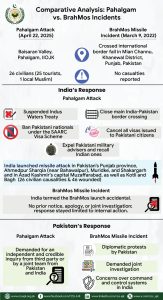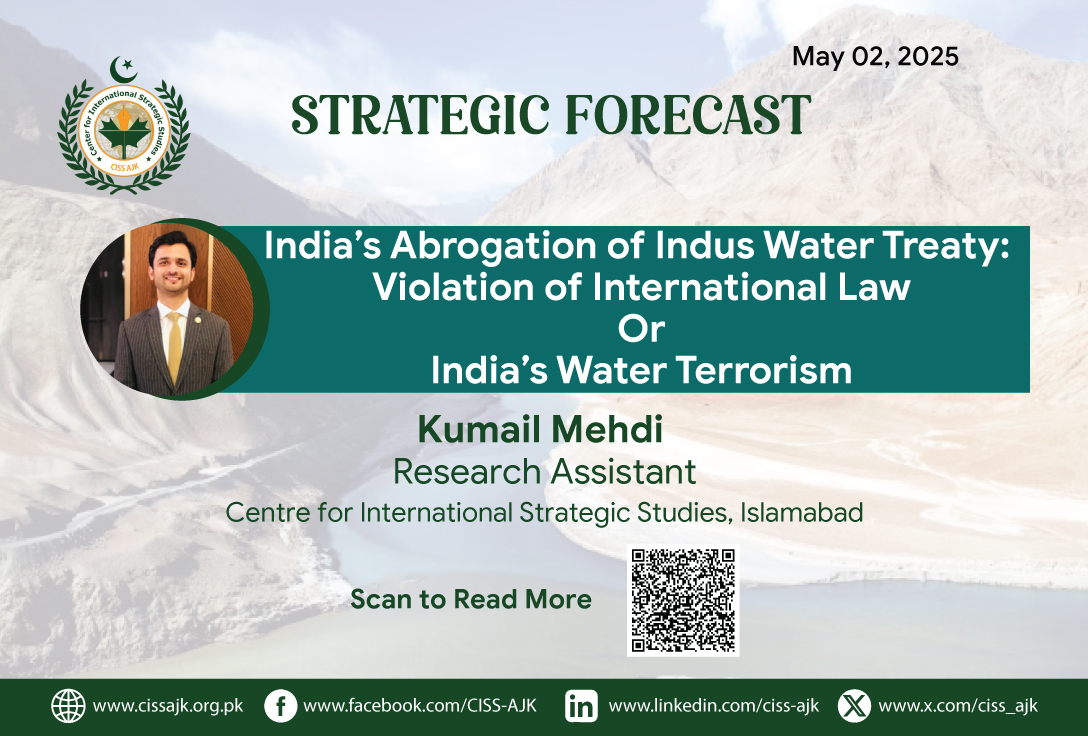 India and Pakistan, two nuclear-armed states in South Asia, have a history of mistrust and conflict, primarily driven by the territorial dispute of Kashmir. As a consequence of the recent incident at Pahalgam, in Indian illegally occupied Jammu and Kashmir (IIOJK), New Delhi has started pointing fingers towards Pakistan without proof. India has taken the extreme step of unilaterally abrogating the Indus Water Treaty (IWT), an irresponsible and illegal step taken by India. In the absence of a bilateral framework like IWT, Pakistan will be deprived of its water, thus creating an existential crisis for it in the foreseeable future.
India and Pakistan, two nuclear-armed states in South Asia, have a history of mistrust and conflict, primarily driven by the territorial dispute of Kashmir. As a consequence of the recent incident at Pahalgam, in Indian illegally occupied Jammu and Kashmir (IIOJK), New Delhi has started pointing fingers towards Pakistan without proof. India has taken the extreme step of unilaterally abrogating the Indus Water Treaty (IWT), an irresponsible and illegal step taken by India. In the absence of a bilateral framework like IWT, Pakistan will be deprived of its water, thus creating an existential crisis for it in the foreseeable future.
Control over natural resources has always been a key determinant of instability and wars. Michael T. Klare, in his book “Resource Wars“, writes ‘competition for natural resources is a primary cause of global conflicts, and resource scarcity will be the formidable cause of wars in the 21st century. According to the Rational actor theory, given sufficient reasons to mistrust each other, when the mistrust of the control of essential resources becomes a part, the likelihood of aggression and conflicts increases. This is because resources support existence, and existence is dear to every actor (state, society, and individual). India’s recent action is to secure more water for its usage; however, doing so will deprive Pakistan of the water share provided to it under international law.
India has stated that it will abrogate the IWT. In a statement by the Ministry of External Affairs, “The IWT will be held in abeyance immediately until Pakistan credibly and irrevocably abjures its support for cross-border terrorism”. According to the Indus Water Treaty, India was given control of three eastern rivers (Ravi, Sutlej, Beas). Pakistan received three western rivers (Indus, Jhelum, and Chenab This unilateral step violates international law because the measure will allow the upper riparian state to block or alter the flow of a river, thus depriving the lower riparian state of water. In addition, any measure restricting the water supply will compel Pakistan to employ appropriate measures to ensure a stable water supply.
There is more to what meets the eye. The unilateral decision can be deciphered from the prevailing Hindutva mindset, which is aimed at demonizing Pakistan. The campaign runners’ forefront includes India’s incumbent political leadership, which is heavily influenced by the Hindutva ideology. It argues that the ideological impact on the Indian ruling elite has created a bias towards Muslims, especially against Pakistan. This bias was also reflected in the Modi government of Gujarat in 2002 when state machinery under his control did not step in to prevent the massacre of Muslims in Gujarat. Likewise, the hatred is evident as the Modi government has begun blaming Pakistan for the attack. Without confirmation, it traced the links of the terrorists with Lashkar-e-Taiba. PM Modi said that his government would identify, track, and punish every terrorist and their backers beyond their imagination. Pakistan responded by condemning this attack and dissociating itself from the bloodshed.
Lt. Gen. (ret.) Khalid Kidwai, former Director General of Pakistan’s Strategic Plans Division, argued that one of Islamabad’s potential thresholds includes New Delhi’s economic strangulation of Pakistan to stop the flow of the Indus River system. The statement depicts the significance of the Indus River basin for Pakistan. The reason is that Pakistan is heavily dependent on the Indus River Basin. Around 80% of its cultivated lands—16 million hectares—rely on water from the Indus River. Besides, the river system is a major source of fresh water for millions across Pakistan. Therefore, if India tries to cut off the water supply to Pakistan, the latter will reply befittingly. Pakistan’s National Security Committee has stated that any unilateral action to stop the water supply would be considered an act of war.
What potential initiatives can Pakistan undertake to counter India’s move? Pakistan should immediately send a high-level delegation to the World Bank headquarters because the flat is the sovereign guarantor of the treaty. It should raise the issue at the United Nations General Assembly in the next few days and inform the UN members of the horrific consequences of the abrogation of the treaty for the Pakistani people. Besides, Islamabad should also convey to the P-5 members of the Security Council that, because of India’s belligerent action, Pakistan would be compelled to resort to kinetic options if India interferes with Pakistan’s water granted to it as per the rules of IWT.
In conclusion, India’s decision to put the IWT in abeyance demonstrates New Delhi’s disregard for international law, which is a serious concern. New Delhi is resorting to water terrorism, which will have implications for the stability and peace of the region, because the IWT is viewed as a key Confidence-Building Measure (CBM) between India and Pakistan. It is high time to diplomatically highlight India’s duplicity and expose its real face to the world. The occasion also provides an opportunity for Pakistan to demand a larger water share because climate change has lowered water levels across Pakistan. Therefore, if India continues with its decision to abrogate the treaty and starts preparing to restrict Pakistan’s water, the latter will be left with no option but to respond kinetically.
Bio: Kumail Mehdi is a research assistant at the Centre for International Strategic Studies, Islamabad.

